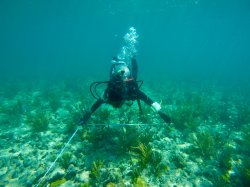Tropical Cyclones are a Growing Threat to Coastal Ecosystems, New Study Shows
New research led by Montclair professor shows past and potential future impacts of storms on marine life
Posted in: Press Releases, Research, Science and Technology

A new first-of-its-kind study, published in Communications Earth & Environment by researchers from Montclair State University and international institutions, highlights alarming trends in the damage caused by tropical cyclones to coastal ecosystems.
Montclair Associate Professor of Biology Colette Feehan led a team of researchers to examine the cumulative impacts of increasing tropical cyclone activity in the North Atlantic region over the past 50 years.
“Our research shows that as tropical cyclones become stronger, the damage to coastal ecosystems can become more severe and widespread,” says Feehan. “Mangroves, coral reefs, salt marshes, and other coastal habitats are vulnerable to these impacts, occurring in response to a range of tropical cyclone attributes, including winds, waves, and surge.”
What is a tropical cyclone?
A tropical cyclone is a powerful rotating storm system that forms over warm ocean waters near the equator. Depending on the region, it may be called a hurricane (in the North Atlantic and Northeast Pacific), typhoon (in the Northwest Pacific), or simply a cyclone (in the Indian Ocean and South Pacific). These storms draw energy from warm ocean waters and are characterized by strong winds, heavy rainfall, and low-pressure centers. Over days, they can intensify into some of the most destructive natural phenomena.
After forming, tropical cyclones can travel hundreds to thousands of miles, often crossing entire ocean basins. Many make landfall, causing significant damage before weakening over land or cooler waters, while others dissipate entirely over the open ocean. Their paths and impacts depend on regional conditions such as wind patterns, water temperatures, and geography.
Key takeaways and why this research matters
The study’s findings suggest that intensifying future tropical cyclones, driven by climate change, pose escalating risks to essential ecosystems that provide natural protection, support biodiversity, and sustain coastal economies.
Analyzing data from 97 tropical cyclones impacting diverse ecosystems throughout the North Atlantic, the researchers focused on immediate ecological consequences like species mortality, habitat destruction, and shifts in community structure.
The study’s findings indicate severe damage occurred most on mangrove forests, where strong winds lead to felled and broken trees. Coral reefs, on the other hand, suffer primarily from cyclone-driven wave damage, which breaks and dislodges coral structures critical for marine biodiversity.
Looking ahead
The research team led by Feehan, which also includes experts from the University of Western Australia, University of Canterbury, and Rutgers University, calls for targeted conservation strategies to protect vulnerable ecosystems and to mitigate the cascading effects of tropical cyclone damage on marine biodiversity and the livelihoods of coastal communities.
The researchers also stress the urgency of global action, as warming oceans are fueling stronger tropical cyclones. “Protecting and restoring these ecosystems is essential for building resilience against the growing intensity of tropical cyclones,” says Feehan. “This is not just about saving habitats—it’s about safeguarding our future.”
